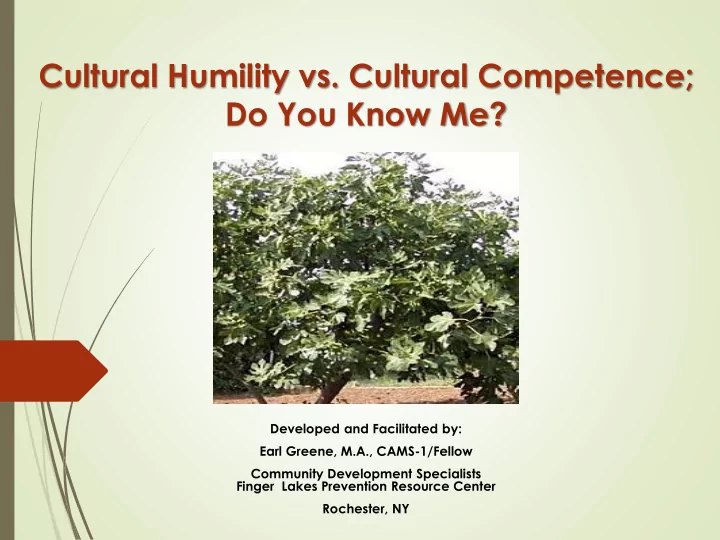

Cultural Humility vs. Cultural Competence; Do You Know Me? Developed and Facilitated by: Earl Greene, M.A., CAMS-1/Fellow Community Development Specialists Finger Lakes Prevention Resource Center Rochester, NY
Some Exercises in Self Reflection Identify your own cultural and family beliefs and values. Define your own personal culture/identity: ethnicity, age, experience, education, socio-economic status, gender, sexual orientation, religion… Are you aware of your personal biases and assumptions about people with different values than yours? Challenge yourself in identifying your own values as the “norm.” Describe a time when you became aware of being different from other people.
Definitions: Culture refers to integrated patterns of human behavior that include the language, thoughts, communications, actions, customs, beliefs, values, and institutions of racial, ethnic, religious, or social groups. Cultural and Linguistic Competence is a set of congruent behaviors, attitudes, and policies that come together in a system, agency, or among professionals that enables effective work in cross-cultural situations. Competence implies having the capacity to function effectively as an individual and an organization within the context of the cultural beliefs, behaviors, and needs presented by consumers and their communities. Resource: U.S. Department of Health and Human Services, Office of Minority Health (Adapted from Cross, 1989).
Defining Culture “Culture does not determine behavior, but rather affords group members a repertoire of ideas and possible actions, providing the framework through which they understand themselves, their environment, and their experiences. Culture is ever changing and always being revised within the dynamic context of its enactment.
Defining Culture …Individuals choose between various cultural options, and in our multicultural society, many times choose widely between the option offered by a variety of cultural traditions. It is not possible to predict the beliefs and behaviors of individuals based on their race, ethnicity or national origin.” ------- Linda Hunt, Associate Professor of Anthropology at Michigan State University
Defining Culture “Actually, the most important part of culture … Is that which is hidden and internal, but which governs the behavior encounter.” ---- Hall 1976 Consider the Fig Tree Fig trees blooms 3 seasons out of the year & Requires personal Interaction.
The Parallel: Trees of a Forest Trees requires a variety of other types to thrive and have longevity of life. Good health and aging of trees depends on the density of the forest This is why a forest can be identified as a community of trees
Cultural Competence vs. Cultural Humility
Cultural Competence Coalitions need to be able to use their knowledge in a helping, culturally supportive manner. Unfortunately, how we respond is often a gray area of practice: what does it mean to “demonstrate competence in engaging and mobilizing our community? The SPF also asks us to engage with respect for individual differences. How do we know that we are using our cultural knowledge regarding different races, gender expression, age, and the like, in a way that meets the needs of the individual communities? Cultural competency begins with having knowledge of different cultures or aspects of social diversity. However, knowledge alone is not enough. (Ortega & Coulborn Faller, 2011)
Competence Requires: ➢ Valuing diversity ➢ Conducting self-assessment ➢ Managing the dynamics of difference ➢ Acquiring and integrating cultural knowledge ➢ Adapting to the diversity and the community contexts of the communities you serve
Cultural Humility Cultural Humility is a lifelong process of self- reflection and self-critique. “ Cultural humility…. is best defined not as a discrete end point but as a commitment and active engagement in a lifelong process that individuals enter into on an ongoing basis with patients, communities, colleagues, and with themselves .” Drs. Tervalon and Dr. Murray-Garcia, Cultural Humility versus Cultural Competence
Humility Requires: ➢ Committing to a life long self-evaluation and critique ➢ Developing self-awareness and respect for differences ➢ Redressing power imbalances ➢ Developing mutually beneficial (non- paternalistic) partnerships with communities
Identity Exercise /Tool Geographic Location * Urban * Rural * Suburban * Non-Native * Language * Multilingual * Limited English Proficiency * Education * GED/High School Diploma * B.A./M.A./Prof. Degree * Student * Mentor * Profession * Homemaker * Environmentalist * Immigrant Status * Class * First Generation * Employment Status * Socioeconomic Status * Black * African American * Latino/a * Hispanic * Indigenous * Native American * First Nation * Asian * Pacific Islander * White * Multi-race * Multi-ethnic * Ethnicity * Nationality * Tribal Identity * Female * Male * Man * Woman * Genderqueer * Lesbian * Gay * Bisexual * Transgender * Queer * Heterosexual * Spouse * Single * OTHER * Unmarried * Widowed * Divorced * Married * Partner * Polyamorous * Personality Type * Introvert * Extrovert * Radical * Liberal * Conservative * Political Party * Indigenous Religion * Muslim * Christian * Catholic * Jewish * Buddhist * Polytheistic * Pagan * Agnostic * Atheist * Wiccan * Smoker * Vegan * Vegetarian * Age * Height * Weight * Body Type * Parent/Child Deceased * Matriarch * Patriarch * Mother * Father * Daughter * Son * Grandparent * Great-Grandparent * Sibling * Adopted * Foster * Step * Substance Abuse * Learning Disability * Physical Disability * Survivor/Surviving Illness * Social Challenge * Emotional Challenge * Mental Health Condition * Behavioral Challenge * Developmental Disability * Survivor/Surviving Abuse * Military * Veteran * Law Enforcement * Probationer * Parolee * Unapologetic
Identity Exercise /Tool Which descriptive word / phrase do you identify with most? If “other,” please share. What would you like the dominant culture to know about the group with which you most identify?
“Let each of you look out not only for his own interests, but also for the interests of others.” ---- Philippians 2:4 (NKJV)
Earl Greene, M.A., CAMS-1/Fellow Family Life Center, Newark, NY 315-331-2037 Office 315-871-8046Cell etgreene@yahoo.com Community Development Specialist Finger Lakes Prevention Resource Center (585) 719-3487 egreene@depaul.org
Recommend
More recommend